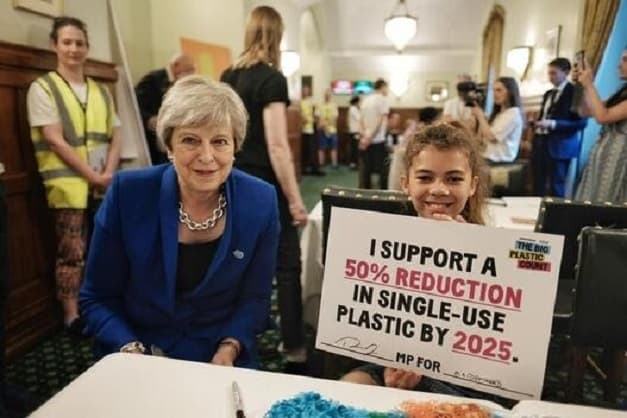
Young members of Margate-based People Dem Collective’s ‘Lived Experience Crew’ Tallulah and Knight, brought the fight against plastic waste to the heart of power last month as they lobbied MP Theresa May to take action against plastic pollution on The Big Plastic Count’s Youth Empowerment Day.
After learning about the role of MPs and why talking to your MP is important, the youngsters created a plastic themed collage to give to their representatives, then set to work lobbying their MP for more action on plastic waste in a face to face meeting in Parliament. They joined students from nine schools from across the country who travelled to London to raise the alarm over the UK’s plastic waste problem.
The trip to Parliament came after pupils took part in The Big Plastic Count, a citizen science project launched by Greenpeace UK and non-profit organisation Everyday Plastic. The count involved some 100,000 households, schools, community groups and businesses across the UK count their plastic packaging waste, record the different types they throw away and enter their results into the campaign website.
The campaign aims to convince the government to take more action to cut plastic production, ban plastic waste exports and transition to refill and reuse alternatives which are affordable, accessible and appropriate for all.
Victoria Barrow Williams from People Dem Collective, said: ‘We’re so excited that youth from our Lived Experience Crew got to learn about the processes of government and see how it works to lobby your MP.
“Engaging them in climate activism and igniting their interest in issues that have a very real impact on their futures was a truly inspiring experience for everyone involved. They’re local MP was unable to attend but that didn’t phase them, instead they asked insightful, impactful questions of Theresa May MP; really holding her to account and ended the day with her signing a commitment to reduce single use plastic by 50% by 2025.”
Knight, eight, said: “It’s unfair that we dump our plastic in other poor countries because they can’t defend themselves.”
Tallulah, 11, added: “ I wish MPs would have more empathy for the animals harmed by the plastic” and then asked Therea May to sign the commitment to reduce single-use plastic by 50% by 2025.
Maja Darlington, plastics campaigner at Greenpeace UK, said: “It’s hugely inspiring seeing these young people get involved and push their MPs for change. Their hard work and enthusiasm has really brought home the problems around the plastic crisis to some of the most powerful people in the country.”
Plastic waste is everywhere but the students told their MPs there are solutions out there – politicians and big businesses just need to grasp them. Whether that’s moving to refill and reuse products that are accessible to all or introducing targets to cut plastic production, by taking the right actions we can get a grip on plastic waste.

